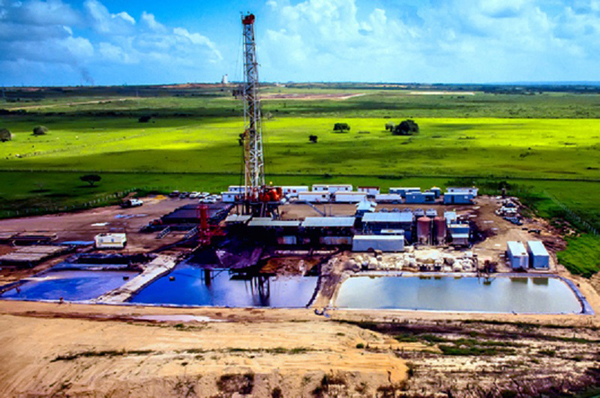- La Feria Community Holds Succesful Business Mixer Event
- Little Nashville to Take Place in Downtown Mercedes
- Lions Basketball Captures District Gold
- La Feria ISD Students Compete in Regional Chess Tournament
- Lions End First Half of 32-4A on a High Note
- La Feria ISD Held Another Successful Parent Conference
- Strong Appearance for Lions at Hidalgo Power Meet
- LFECHS Students Get to Meet Local Actress
- Students Participate in Marine Biology Camp
- Two LFECHS Students Qualify for All-State Band
Evidence Grows of Link Between Fracking, Texas Earthquakes
- Updated: December 8, 2017

Ponds near oil rigs store wastewater from the fracking process, which is disposed of by injecting it back into the well. Some scientists believe this can cause earthquakes. Photo: GettyImages
by Mark Richardson
DALLAS – A new study is adding fuel to the debate over whether recent earthquakes in Texas are caused by oil and gas operations or natural geologic events.
The study by Southern Methodist University and the U.S. Geological Survey points to evidence that injecting wastewater into gas wells during the process of hydraulic fracturing is likely causing an increasing number of quakes, in a region where there were almost none a decade ago.
Luke Metzger, director of the advocacy group Environment Texas, says the study bolsters the belief that fracking is the cause of the problem.
“This is the latest in a series of studies, which all have found that connection between the earthquakes and human activity, and specifically wastewater injection,” he states. “And the oil and gas industry has attempted to shed doubt on some of these findings.”
Metzger says in 2008, there were only two earthquakes of magnitude 3 or higher in Texas, but there were 12 just 8 years later.
The study says while most quakes are triggered by natural causes, recent clusters of medium tremors in north, west and south Texas have consistently occurred near oil and gas operations.
Metzger says the energy industry is fighting the evidence through heavy lobbying of state lawmakers and regulators.
“When Exxon was accused of triggering some of the earthquakes from one of its injection wells, the Railroad Commission ruled against the scientists and for XTO’s position,” he points out. “So, the oil and gas industry has been successful in getting government regulators to ignore the science and act on their behalf.”
Metzger points out that the state recently required well operators in one earthquake-prone region to reduce injection volumes and pressure, which has resulted in fewer quakes.
“More could be done in terms of more tightly deregulating those injection wells and doing more to prevent the waste from being injected in the first place – for example, by requiring the recycling of that frack water to reuse in fracking, rather than injecting it in these injection wells,” he states.
Metzger maintains this and similar studies should convince regulators and the oil industry to take additional steps to lower earthquake risks, particularly in or near populated areas.


